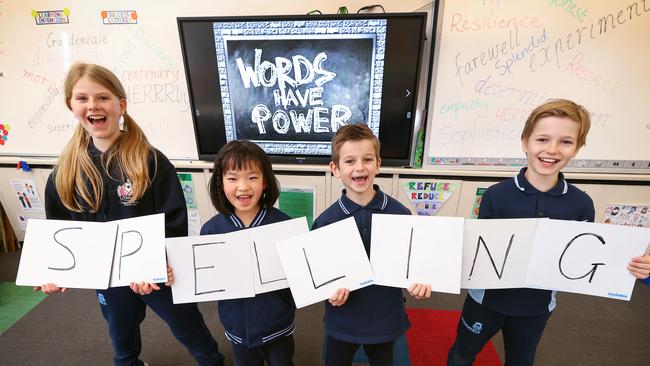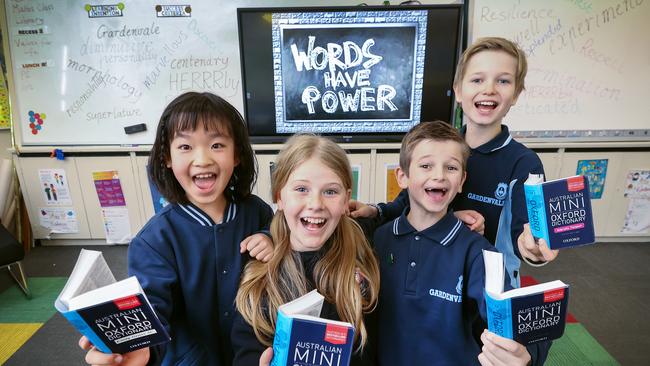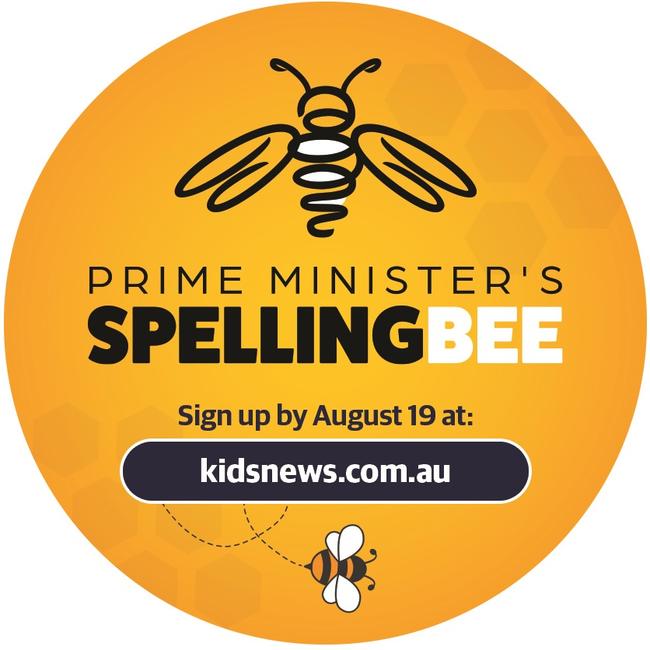Aussie states missing NAPLAN targets revealed
As the Prime Minister’s Spelling Bee kicks off, see if your state’s spelling and reading NAPLAN scores make the national grade.
Education
Don't miss out on the headlines from Education. Followed categories will be added to My News.
Just three Australian states and territories make the grade when it comes to producing spelling high-flyers.
Analysis of the most recent NAPLAN data shows only Victoria, the ACT and NSW beat national percentages of students with above-average spelling skills.
Nationwide scores show more than 85 per cent of grade three students, 84.7 per cent of grade fives and 83.6 year seven students rank above standard in spelling.
But Queensland, South Australia, Tasmania and the Northern Territory missed the national standard at all three of those year levels, while year seven students in Western Australia only slightly exceeded the national benchmark.
The Northern Territory trails national targets across all assessed grades in spelling and reading by at least 25 per cent, and has the highest proportion of students below standard in the country.
The review of Australia’s spelling results comes as Kids News prepares to launch the Prime Minister’s Spelling Bee, a free online competition that aims to boost spelling skills in students in years 3-8.
Meanwhile, Victorian students trumped national averages in both reading and spelling skills last year.
Even with a slight downturn among year seven students, Victorian year sevens had the highest percentage of that cohort with above-average reading skills in the country at 86.1 per cent, followed by ACT at 84.2 per cent.

Despite just three states trumping national standards and a slight dip in writing skills, Australian Curriculum, Assessment and Reporting Authority (ACARA) chief executive David de Carvalho said overall results had significantly improved over the years.
“When you compare last year’s (2021) results with the base year (2008), Year 3 and Year 5 reading and spelling have significantly improved. When you take all assessment years into account, there is a steady upward trend in spelling across all years and Year 3 and 5 results in reading have also steadily increased,” he said.
“The overall decline in writing has begun to flatten but the writing results are still below where they were when writing was first tested, with the exception of Year 3.”
Monash University senior educational assessment and ethics lecturer Dr Illana Finefter-Rosenbluh said a range of factors influence a child’s NAPLAN performance, but acknowledged the contested assessment had limitations.
“There are a number of key factors outside of the school system which play a crucial part in students’ achievement, including their socio-economic background or household income and location, parental education and employment, English proficiency, Indigenous and Torres Strait Islander status, internet access and disability,” she said.
“Aboriginal and Torres Strait Islander students, particularly those who live in very remote areas, are more likely to score below national standard, and research also shows that 33% of students with a disability perform poorly on the writing domain.”
Spelling expert Dr Tessa Daffern, from the University of Canberra, said students’ skills slipped as they got older.

Dr Daffern’s study of NAPLAN spelling performance followed six groups of students as they moved through NAPLAN testing from Year 3 to Year 9.
“Less students were achieving at or above the minimum national benchmark as they got older,” Dr Daffern said.
“More students were slipping back, they were not keeping up with where they were before.”
Dr Daffern said the decline was sharpest from Year 7 to Year 9.
“The fact that this data set shows a consistent trend of decline, not just with one cohort of students but six different cohorts of students, suggests that the teaching of spelling needs to continue in the high school years for many students.”
Gardenvale Primary School principal Janine Hall said the school’s NAPLAN spelling results have grown significantly in recent years after multiple year levels began practising using the educational tool Smart Spelling.
541 students showed above average spelling skills in 2021, compared to 521 in 2016.
“We have seen a marked development in the children’s spelling ability,” Ms Hall said.
“A few years ago, we were falling behind, so there has been improvement with consistent practice.”
The Prime Minister’s Spelling Bee is a national spelling competition for schoolchildren from Years 3 to 8 that aims to promote and encourage students’ oral and written literacy and spelling skills.
The Prime Minister’s Spelling Bee is a free online competition aimed at boosting literacy and a love of learning in students in Years 3-8. Registrations open on July 25. See kidsnews.com.au
More Coverage





